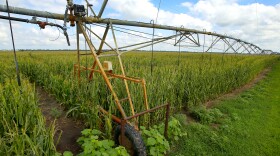-
Congress extends critical Farm Bill for a third time. It's a relief for farmers, but raises concernsThe federal funding package to reopen the government included a one-year extension of certain 2018 Farm Bill programs. Several expired Sept. 30 or would have been null by the end of the year.
-
Supply is expected to surpass traditional grain storage capacity in Iowa, Kansas, Missouri and Nebraska. Some elevators, including historic Ely's in Nebraska, are adding temporary storage.
-
Popcorn festivals and even "popcorn capitals of the world" dot the middle of the country. Yet this ubiquitous snack is grown on fewer than 1,000 farms in the U.S. today.
-
The FBI and Department of Justice hailed the arrests and charges as crucial in protecting national security and public safety. Researchers say the fungus is found in wheat and barley crops and is commonly studied.
-
Scientists in Kansas, Missouri and other states were poised to start research to cut U.S. reliance on fertilizer imports, keep biofuel farming cost-competitive and tackle a potent greenhouse gas.
-
Recent heat and drought have fueled concerns about this year’s corn crop, as producers in the Midwest see a wide range of conditions.
-
Touting its long history and cultural significance, Mexico’s president says genetically modified corn has no place in his country. That puts Mexico and the U.S. on a collision course over a major trade agreement.
-
Mexico’s plan to ban all genetically modified corn imports has upset U.S. corn farmers, trade groups and officials. The two nations are in talks and have until April 7 to resolve it before the U.S. can take action under the free trade agreement between North American countries.
-
Tar spot, a fungal disease, first appeared in the U.S. in 2015 with reports in Indiana and Illinois. Since then, it has been spreading across the Midwest.
-
Drought is taking its toll on western Kansas cornfields this year. And all that dead corn could mean higher prices for products that depend on the state's grain supply, such as ethanol-infused gasoline and corn-fed beef.

Play Live Radio
Next Up:
0:00
0:00
Available On Air Stations










